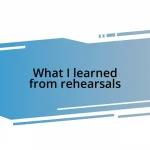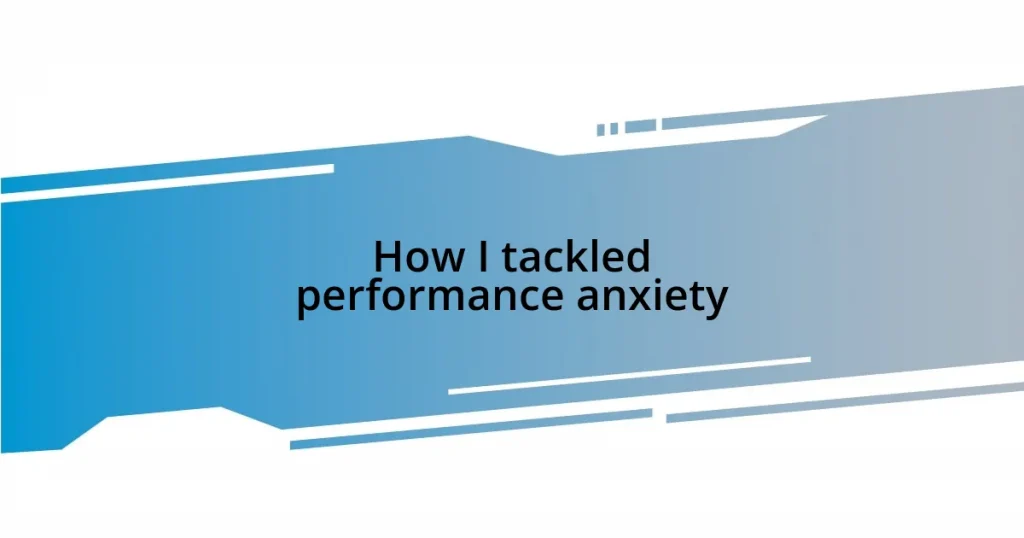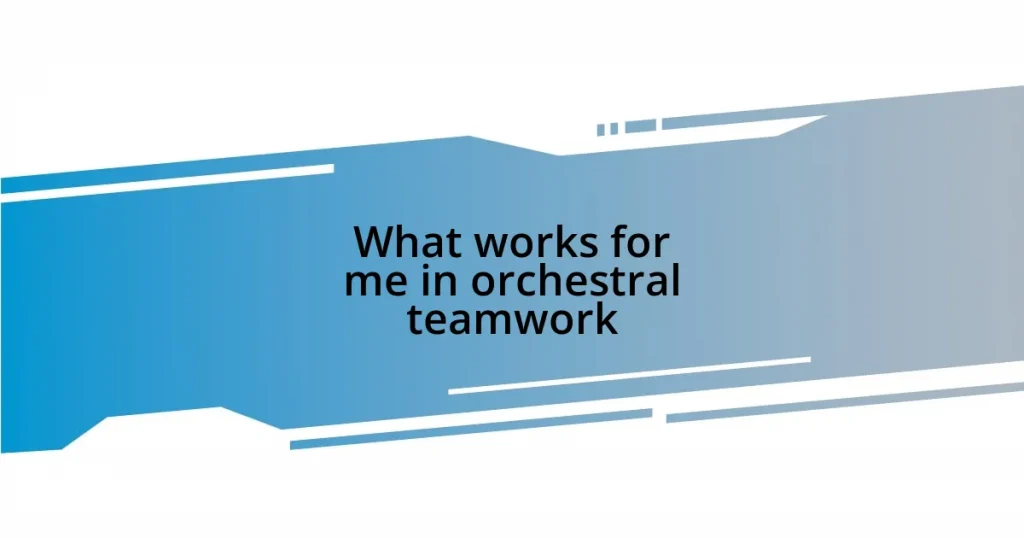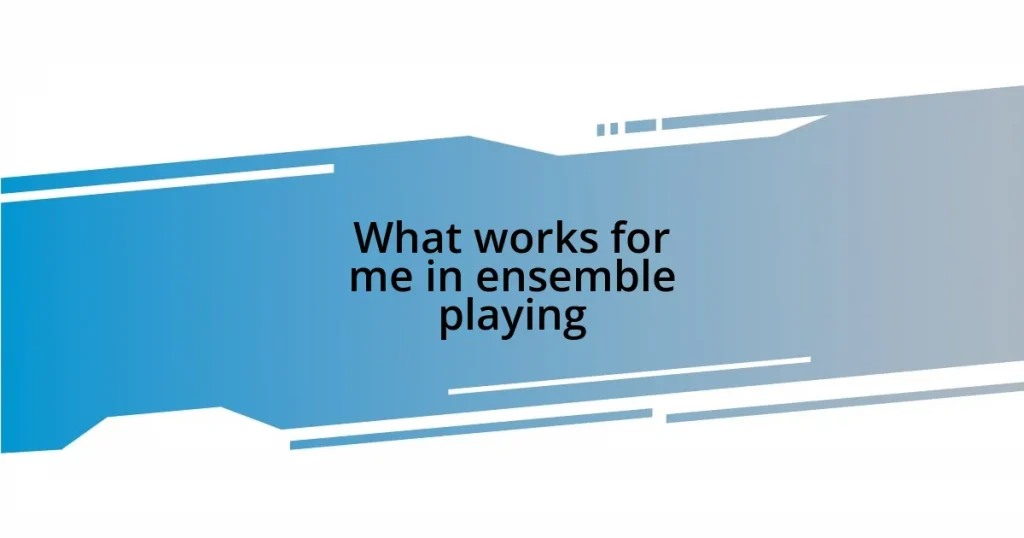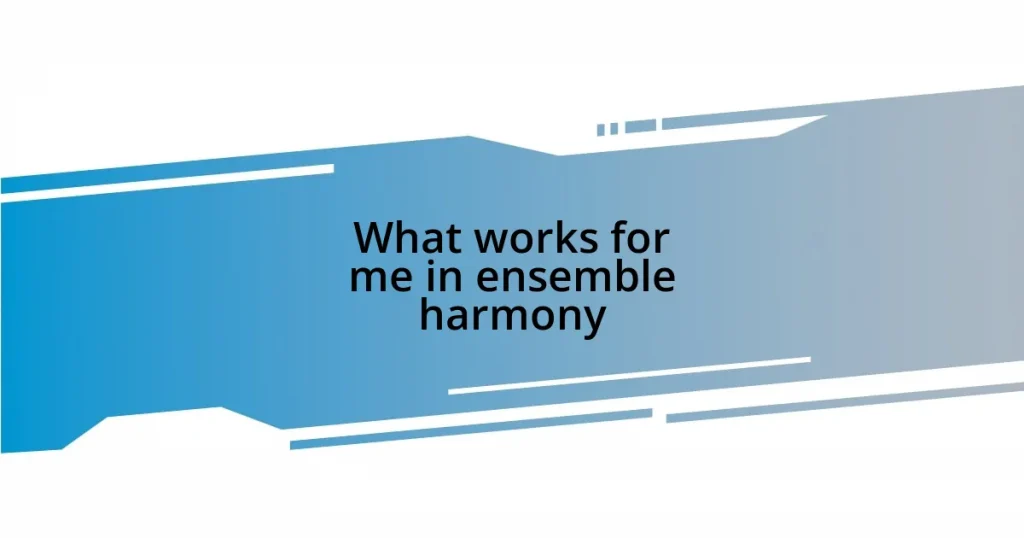Key takeaways:
- Performance anxiety stems from the fear of judgment and high-stakes situations, which can hinder enjoyment and passion.
- Identifying specific anxiety triggers, such as crowded settings and past failures, is crucial for managing performance-related stress.
- Effective strategies include visualization, deep breathing, rehearsing with support, and maintaining a daily journaling practice.
- Seeking support from friends, professionals, and support groups can provide encouragement and valuable insights into overcoming anxiety.
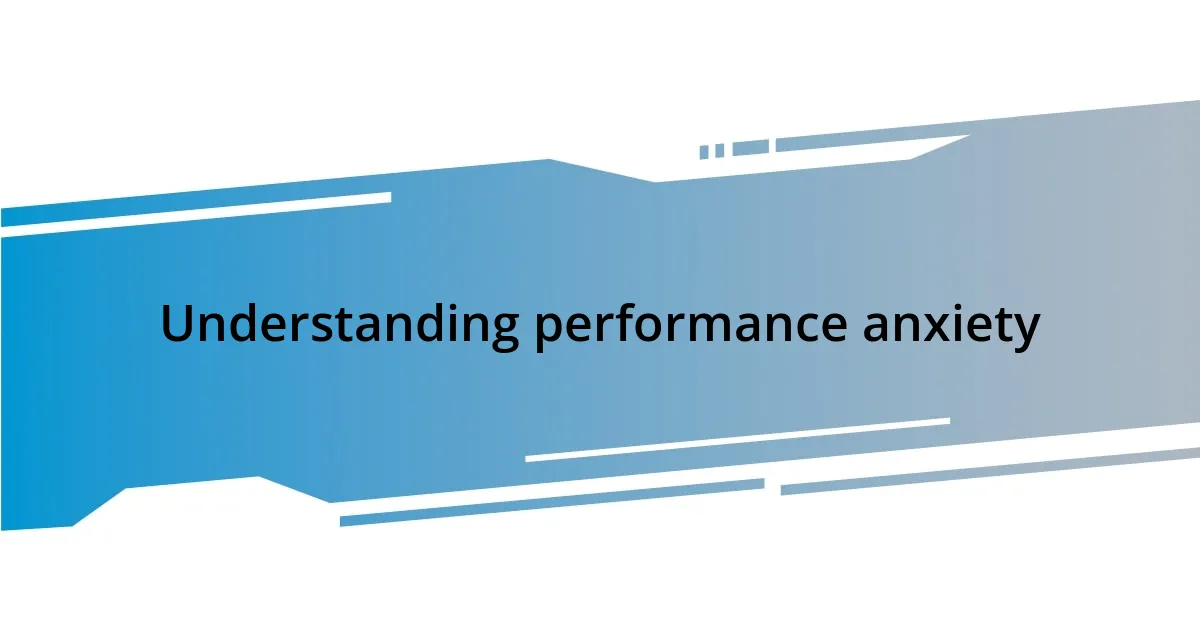
Understanding performance anxiety
Performance anxiety is something that many of us encounter, whether it’s in public speaking, sports, or even daily interactions. I still remember the rush of panic I felt backstage before a big presentation. My heartbeat raced, my palms were sweaty, and I couldn’t shake the feeling that everyone was watching, waiting for me to trip over my words. It’s not just nerves; it’s that overwhelming fear of judgment that often accompanies the desire to succeed.
What I find fascinating about performance anxiety is how it can manifest differently depending on the situation. Have you ever felt your breath quicken just before stepping into a meeting? In my experience, it often feels like the pressure to perform well can actually take away from the passion I have for the task at hand. I’ve had days when I was so focused on not failing that I forgot to enjoy what I was doing altogether.
I’ve also learned that sometimes, understanding the root of this anxiety can help us cope better. Reflecting on why I felt that way helped me realize that it often stemmed from wanting to meet expectations—both mine and those of others. Isn’t it intriguing how we can build these scenarios in our minds, creating a mountain out of what might just be a small hill? Exploring that mental landscape can be a crucial step toward managing performance anxiety effectively.
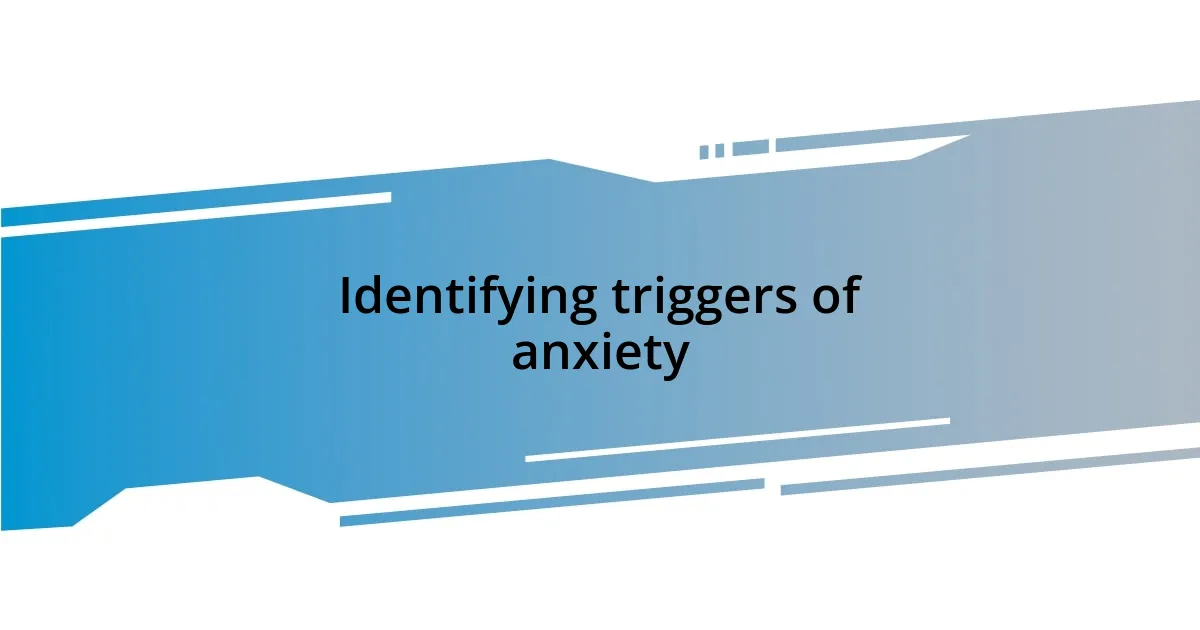
Identifying triggers of anxiety
To tackle performance anxiety, the first step involves identifying the specific triggers. I’ve noticed that certain situations consistently ignite that familiar wave of panic. It could be a crowded room during a presentation or the moment I step up to bat in a tense game. Recognizing that the anxiety often stems from a fear of judgment was eye-opening for me; it helped in mapping out my emotional landscape.
Here are some common triggers that I’ve identified, which may resonate with your experiences too:
– Crowded settings: The more faces watching, the more pressure I felt.
– High stakes: Situations where a lot is on the line often intensified my anxiety.
– Unexpected questions: I’ve found that being caught off guard could spike my nervousness significantly.
– Past failures: Remembering earlier mistakes haunted me, amplifying the fear of repeating them.
– Comparisons to others: Seeing peers excel often made me question my own worth and abilities.
Understanding these triggers has been vital for me. The more I reflect on the scenarios that fuel my anxiety, the more equipped I feel to address them head-on. That’s how I turned a once-overwhelming feeling into an opportunity for growth.
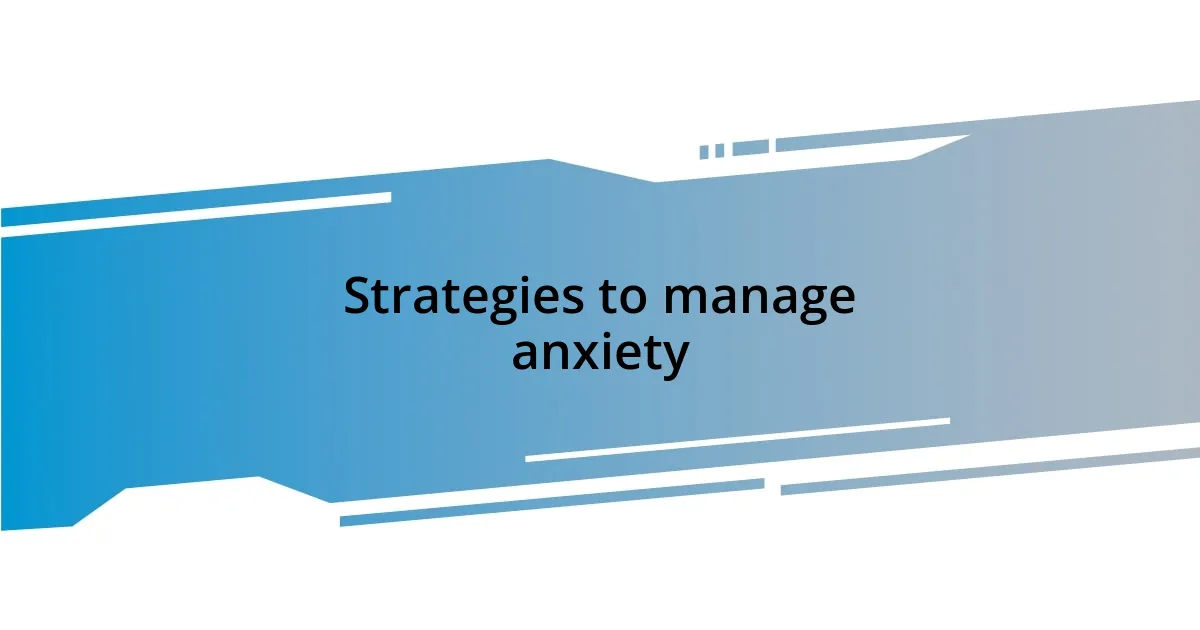
Strategies to manage anxiety
To manage performance anxiety effectively, I’ve leaned heavily on a few practical strategies. One approach I’ve found particularly helpful is visualization. Before a big presentation, I take a moment to close my eyes and imagine myself succeeding. It might sound simple, but envisioning a positive outcome can shift my mindset from anxiety to confidence. Have you ever tried picturing your success? It can really change the way you feel in the moment.
Another strategy I advocate for is deep breathing exercises. In situations where I feel the familiar knots in my stomach, taking a few slow, deliberate breaths helps ground me. This practice allows me to reclaim a sense of control. I’ve learned that counting my breaths while focusing on the air flowing in and out can ease my heart rate significantly. It’s like hitting a reset button for my mind. This might be something you can incorporate into your routine too.
Lastly, rehearsing in front of a trusted friend or family member has been a game-changer for me. Their feedback offers me perspective, and that gentle practice instills a sense of familiarity with the material. I recall a time when I was rehearsing for a crucial work presentation, and the constructive criticism I received not only helped me refine my content but also built my confidence. Do you have someone you could practice with? Finding that support can really make a difference.
| Strategy | Description |
|---|---|
| Visualization | Imagine yourself succeeding to shift mindset from anxiety to confidence. |
| Deep Breathing | Use slow breaths to ground yourself and regain control during high-pressure moments. |
| Rehearsing with Support | Practice in front of someone you trust to gain perspective and boost confidence. |
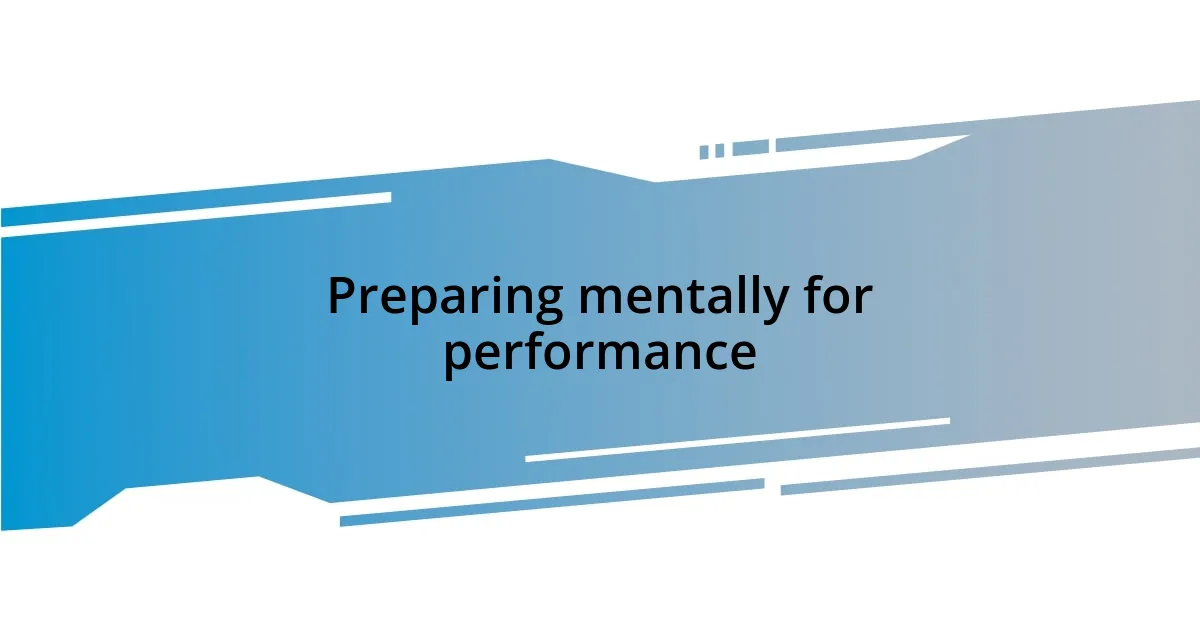
Preparing mentally for performance
When preparing mentally for performance, I have found that setting a clear intention is crucial. Before stepping on stage or into a meeting, I take a moment to center myself and focus on what I want to achieve. This could be as simple as wanting to connect with my audience or sharing my ideas effectively. It changes the narrative in my mind from worrying about how I’ll be judged to focusing on how I can contribute. Have you ever considered what your intentions might be before a big moment?
I’ve also discovered that practicing mindfulness can be a powerful tool in my mental preparation. In the days leading up to a performance, I commit to a few minutes of mindfulness meditation each morning. This practice helps me cultivate a sense of calmness that lingers throughout the day. I recall one particular time when I was genuinely surprised by how much it quelled my racing thoughts. Instead of feeling overwhelmed, I found a sense of clarity and purpose. Might dedicating a few moments to mindfulness benefit you as well?
Another technique that has transformed my mental preparation is positive self-talk. I’ve learned to catch and redirect negative thoughts, replacing them with affirmations. For instance, I often remind myself, “I am prepared, and I trust my abilities.” It may seem a bit cliché, but I found this practice does wonders for my self-esteem just before I step into the spotlight. It’s like giving myself a pep talk that turns doubt into fuel. Have you tried speaking kindly to yourself before important moments? You might be surprised at how much it can shift your mindset.
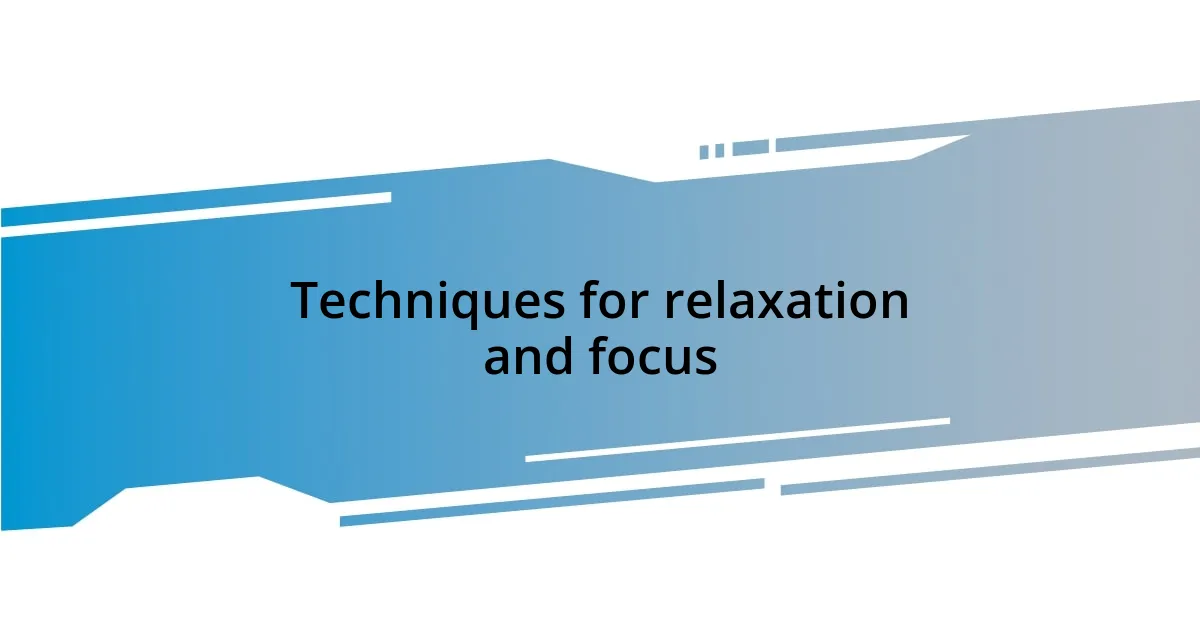
Techniques for relaxation and focus
One of my go-to techniques for relaxation is progressive muscle relaxation. I remember the first time I tried it before a performance; I was sitting backstage, feeling the tension in my shoulders. By systematically tensing and then relaxing each muscle group, I discovered an incredible release of tension. Have you ever noticed how your body holds onto stress? This technique can help let go of physical anxiety and ultimately calm your mind.
Another practice I’ve embraced is incorporating calming sounds into my preparation routine. Playing soft instrumental music or nature sounds allows me to create a serene atmosphere, even in chaotic environments. I recall a stressful day when I felt completely overwhelmed; I slipped on my headphones, closed my eyes, and let the soothing melodies wash over me. It felt like a mini-vacation for my mind. Have you thought about how sounds can influence your mood? It’s essential to find what resonates with you.
Lastly, maintaining a daily journaling practice has become an invaluable tool for me. Each evening, I take a few moments to jot down my thoughts, feelings, and any lingering anxieties. It was eye-opening to see how articulating my worries on paper made them feel more manageable. Whenever I pen down my triumphs, no matter how small, it reinforces a sense of accomplishment, even before performance day arrives. Have you ever considered journaling as a way to process and focus your thoughts? It’s a meaningful practice that can enhance clarity and calm your mind.
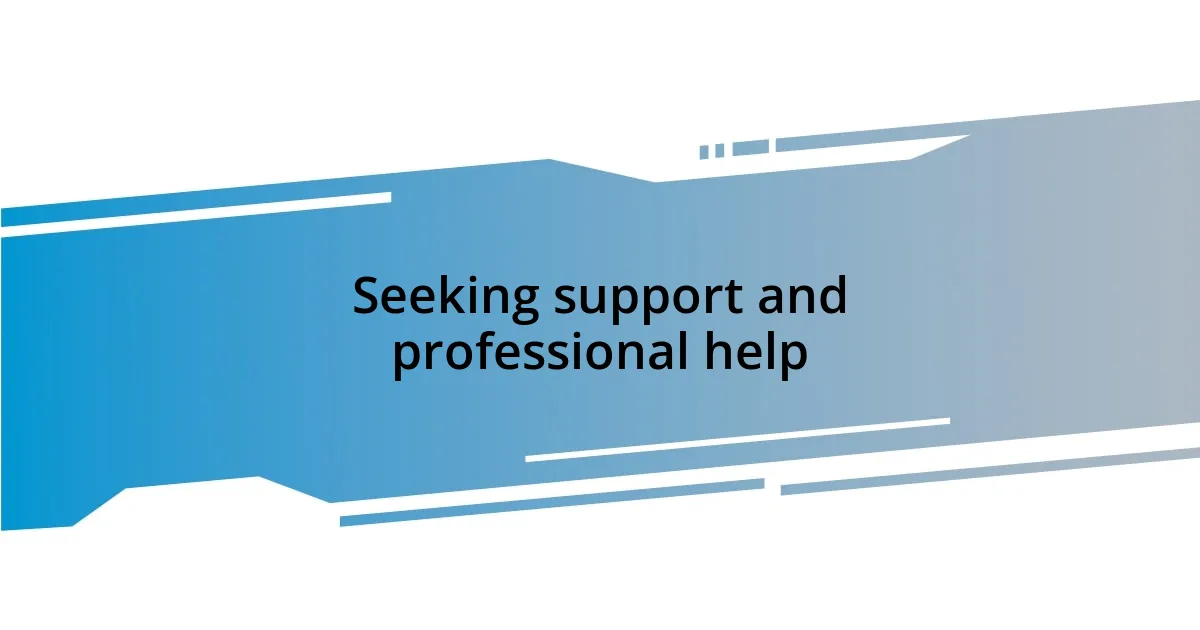
Seeking support and professional help
As I navigated through my performance anxiety, I realized that seeking support from others can be a game-changer. There was a time when I hesitated to share my struggles, thinking I had to tackle everything alone. However, opening up to trusted friends revealed how many of them had similar experiences, and it became a vital source of encouragement and perspective. Have you ever considered how much lighter your burden might feel when shared with someone who understands?
Professional help, too, has been a turning point in my journey. I remember walking into my first session with a therapist, feeling a mix of apprehension and hope. Those conversations provided me with practical strategies tailored to my specific challenges, which has been immensely beneficial. Talking with a professional can often lead to insights you might not see on your own. Have you thought about how a fresh perspective could open new doors for you?
Additionally, I’ve discovered the value of joining support groups. The shared stories in these settings can create an atmosphere of camaraderie that’s reassuring and empowering. One memorable meeting was when someone shared how they transformed their fear into creativity, reminding us that we aren’t alone in our experiences. That reminder hit home for me, reinforcing the importance of community. Isn’t it comforting to know that there’s a whole group of people rooting for one another in the journey of overcoming anxiety?
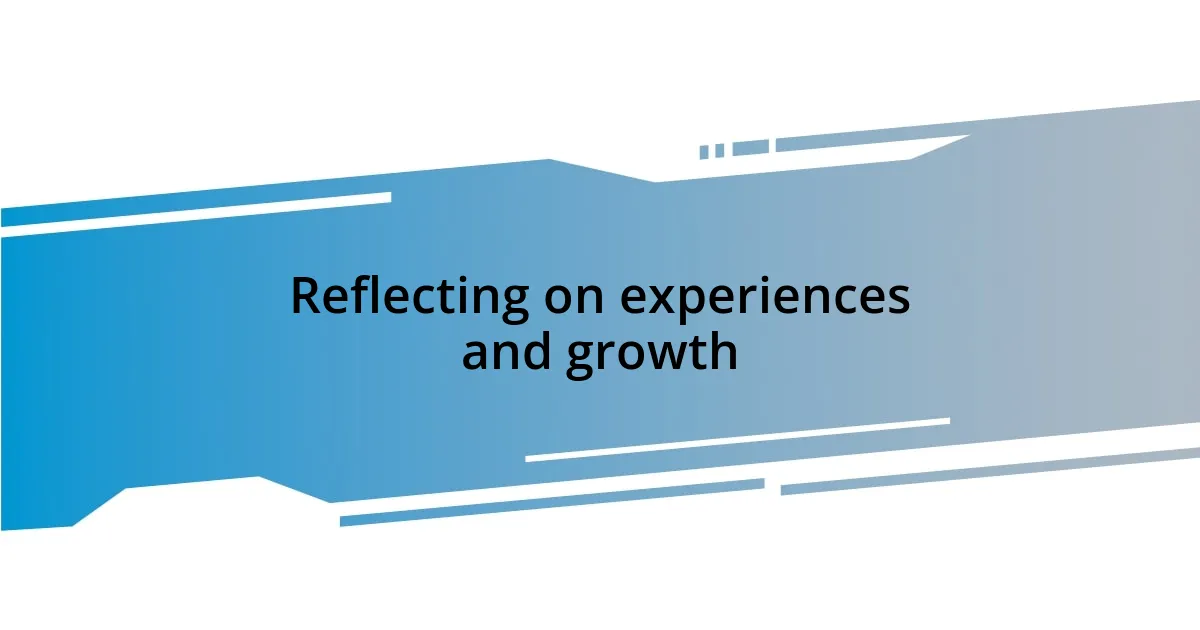
Reflecting on experiences and growth
Reflecting on my journey through performance anxiety has been a profound experience. I still recall the exhausting nights of self-doubt, when I lay awake replaying my performances in my mind. Now, I view these moments as crucial learning opportunities. Each time I confronted my fears, I unearthed something new about myself. Have you ever paused to appreciate how your past experiences shape your growth?
It’s fascinating to see how each challenge added layers to my character. I remember a particularly overwhelming performance where I faltered, but instead of spiraling into self-criticism, I chose to analyze what went wrong. This shift in perspective transformed failure into a valuable lesson. It taught me resilience, and I realized that every setback harbored the seeds of growth. Have you reflected on how setbacks in your life might actually be stepping stones?
Over time, this process of reflection has evolved into a habit. I often find myself revisiting those intense moments—not to dwell on the fear, but to embrace the growth that followed. It’s like flipping through a scrapbook of my emotional evolution. Each memory evokes a mix of anxiety and pride, reminding me how far I’ve come. Isn’t it empowering to recognize that every bit of discomfort has nudged us closer to becoming our best selves?





